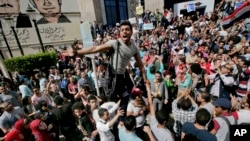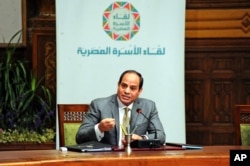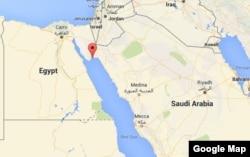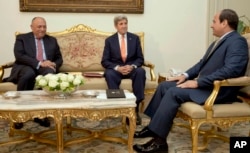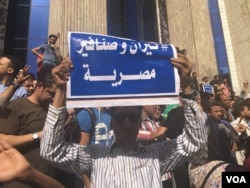Protesters who mounted rare anti-government demonstrations on April 15 to express their anger with Egyptian President Abdel Fattah el-Sissi’s decision to gift two uninhabited Red Sea islands once considered Egyptian to Saudi Arabia have vowed to stage mass sit-ins Monday to mark a patriotic public holiday, Sinai Liberation Day.
Egypt authorities have arrested dozens of activists ahead of Monday’s planned anti-government protests, according to a group of lawyers, which published a list of 59 detainees. The arrests since Thursday have involved raids on cafes and homes in the Egyptian capital.
In a televised address Sunday el -Sissi urged Egyptians to protect the state and its institutions from the “forces of evil.” “We must protect these institutions because these mean the state. I am reiterating to the Egyptian people this is the responsibility of all of us, for us to protect this security and stability,” he said.
His remarks raise the prospect of large-scale counter-protests being mounted — it also raises the stakes on a much sharper confrontation taking place between the government and its opponents.
Analysts: el-Sissi's popularity may be slipping
While no observers are suggesting Egypt is about to be plunged into the kind of chaos that shook the country in the lead-up to the 2011 Arab spring ouster of Egyptian strongman Hosni Mubarak, the very fact that protesters are ready to defy the government in large numbers despite the ban on demonstrations underscores growing public discontent with el-Sissi, say analysts.
The protests also suggest that el-Sissi opponents — liberal and Islamist — are starting to shake off their fear of the military-backed regime. That is the view of Egyptian actor and television host Khaled Abol Naga.“Egyptians conquered today fear of being beaten by another tyrant tune to our inner power,” he tweeted on April 15.
Large-scale street demonstrations virtually vanished from Egyptian streets after security forces in August 2013 killed nearly 1,000 mainly Islamist protesters. They were protesting the military’s ouster of the Muslim Brotherhood’s Mohamed Morsi, the country’s first-freely elected civilian President a month earlier.
The fear factor diminished on April 15 when sit-ins and protests were mounted in 17 of the country’s 27 governorates. Most were small affairs but in Cairo and Alexandria thousands took to the streets chanting “Leave” — the same word was shouted at anti-Mubarak rallies. Other 2011-era chants were heard, including “bread, freedom and social justice” and "the people want the regime to fall.” Protesting without a police permit has been illegal since 2013.
Transfer of islands increased public anger
The sovereignty transfer of the islands of Tiran and Sanafir to Saudi Arabia, a staunch el-Sissi ally, has given the protest movement new life, allowing liberals and Islamists to unite around a flashpoint issue.
The government appears to have been caught by surprise by the intensity of public anger. The islands reportedly were given to Egypt by Saudi Arabia in 1950 — the Saudis feared Israel might seize them. For the protesters it appears el-Sissi gave up the islands for cash, announcing the transfer when Saudi King Salaman was in Cairo and himself announcing billions of dollars in investments, all of which will help to prop up the el-Sissi government,
The revival in street protest coincides also with the regime’s renewed pursuit of human rights groups in the country, especially those who have received any foreign funding. Several rights and civil society organizations are being investigated for alleged crimes against the state, including seeking to destabilize it.
Concern by Britain and US
A court case against half-a-dozen prominent Egyptian campaigners was postponed last Wednesday during the visit to Cairo of U.S. Secretary of State John Kerry. The American diplomat downplayed media commentary of a widening rift between Washington and Cairo over human rights, saying Egypt is "critical to the peace and security" of the region.
But he did make an oblique reference to the deteriorating human rights situation, one that the White House has increasingly become more public in condemning in recent weeks. “We talked about ways in which we can hopefully resolve some of the differences and questions that have arisen about the internal politics and choices for the people of Egypt,” Kerry said in the Egyptian capital.
On Thursday, Britain’s foreign ministry highlighted its concern about Egypt for the first time in a key rights report. Britain's Foreign and Commonwealth Office noted that the rights situation in Egypt “remained poor and continued to deteriorate.” And it cited several instances of abuse including the sentencing at a mass trial in February of 230 activists to life imprisonment, the death sentence passed on former president Morsi in May, and dozens of cases of torture, police brutality and forced disappearances.
The torture and death of an Italian doctoral student, Giulio Regini, who disappeared in Cairo in January has added to Western alarm. Italian officials and his mother say they suspect Egypt's security forces were behind the killing.
El-Sissi answers critics
El-Sissi rejects Western criticism, saying at a joint press conference recently with French President Francois Hollande, “We are being confronted by an evil force that is trying to shake Egypt, and give a false impression of what is happening in Egypt.” Even so, the Egyptian security services appeared more restrained than usual on April 15 in dealing with the protesters, who complained also about economic mismanagement and security abuses.
More than 250 protesters were arrested nationwide during the April 15 protests, according to Democracy Index, a local NGO. The rights network IFEX, said it had documented 370 arrests. But at one of the biggest protests outside the Journalists’ Syndicate in the city center demonstrators were granted a safe passage by security forces when they decided to exit the area There were some skirmishes between the police, who fired tear-gas, and the protesters who remained.
All protests across the country were dispersed but activists reported only minor injuries.
Likewise, el-Sissi and most top officials remained relatively silent about the April 15 protests, opting to ignore them publicly. The newspaper Al-Shorouk reported last week that the President criticized his security chiefs for “allowing the protests to get out of hand.”
Al-Shorouk claimed el-Sissi warned his security officials that he would not accept any repetition on Sinai Liberation Day. El-Sissi’s office denied the report as “false news.” But the arrests since Thursday suggest the authorities are determined to avoid a repeat of April 15.




